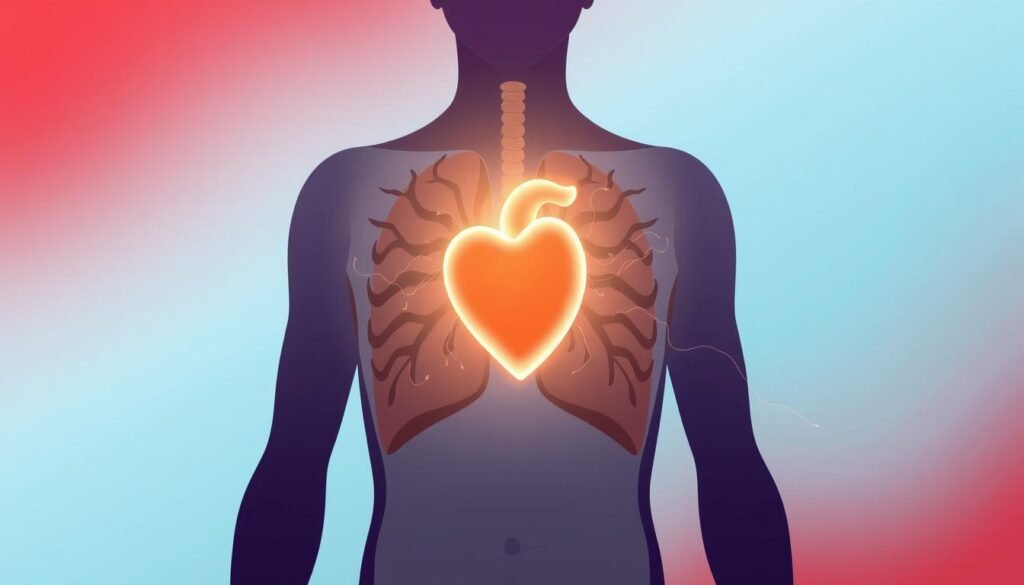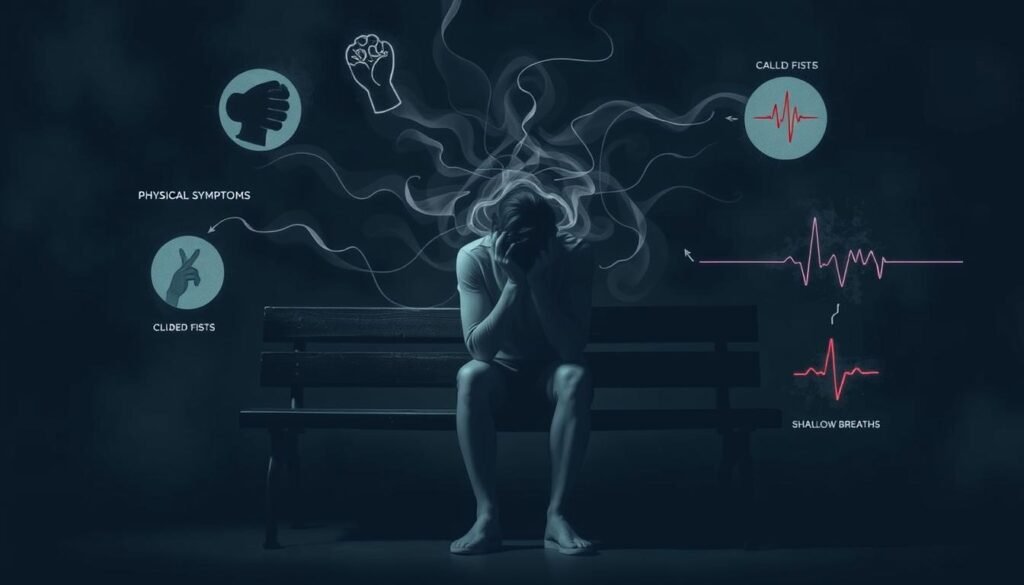Over 60% of people get confused between panic and heart attack symptoms. This is especially true for shortness of breath. About 25% report it as their only sign during a heart attack. It’s key to know where your shortness of breath comes from.
This piece will show how to figure out if your breathing trouble is due to anxiety or heart issues. By exploring both the physical and mental causes, you’ll learn about your symptoms. Recognizing these differences helps in getting the right treatment and managing your health better.
Key Takeaways
- Shortness of breath can come from both anxiety and heart issues.
- Panic attack signs often look a lot like heart attack symptoms.
- Knowing how symptoms differ can help decide on treatments.
- It’s important to get medical advice for new or strange symptoms.
- Long-term health issues can also make you feel breathless.
Understanding Shortness of Breath
Shortness of breath, also known as dyspnea, makes you feel like you can’t get enough air. It can last for a short time or be ongoing. Acute dyspnea occurs from hours to days. Chronic dyspnea lasts longer than four to eight weeks. Knowing both its physical and emotional aspects helps identify its causes.
Dyspnea can result from health problems or stress, including anxiety. Anxiety attacks can make you feel short of breath. This issue not only causes discomfort but also makes daily activities hard. It’s important to figure out and deal with what causes it.
The Modified Medical Research Council (mMRC) scale helps measure how severe your breathing problem is. It ranges from feeling out of breath during hard exercise to not being able to leave home. Shortness of breath can occur with other signs like chest pain, bluish lips, or a fast heartbeat. These symptoms call for urgent medical help.
Knowing the risk factors for shortness of breath is key to managing it. Asthma, pneumonia, and heart issues often cause dyspnea. Other things like environment, chronic respiratory conditions, or weak lungs can make it worse. So, seeing a doctor for sudden or ongoing dyspnea is critical for the right care and treatment.
What Causes Shortness of Breath?
It’s crucial to know why you feel short of breath to treat it right. Various things cause breathlessness. These include problems with the heart, pneumonia, asthma, and feelings of anxiety. Knowing if it’s a health issue or anxiety helps plan the right treatment.
Physical Conditions
Many health problems can make you short of breath. For instance, smoking causes COPD, a major health issue in the U.S. This affects your lungs badly. Asthma and pneumonia are other issues that make it hard to breathe.
Heart issues are also to blame. If your heart isn’t working right, like during a heart attack or failure, you’ll feel out of breath. If you have a fever, chills, or cough with it, see a doctor. Emergency care is needed if you have chest pain, faint, or your lips and nails turn blue.
Being in very hot or cold places can make breathing harder. So can allergens and toxins.
Mental Health Factors
Feeling anxious can also cause shortness of breath. Anxiety makes you more aware of how you breathe. This can lead to feelings similar to panic attacks in people with anxiety disorders.
Anxiety triggers a fast body reaction, changing how you breathe. Knowing this helps figure out if anxiety or a medical issue causes the breathlessness. Managing anxiety can help a lot. You can find out more on managing anxiety in this article.
Anxiety as a Cause of Shortness of Breath
Shortness of breath often comes with anxiety. Knowing this link can help people understand their symptoms better. When you know the signs of anxiety, it’s easier to tell if your breathing issues are more mental than physical.
Common Anxiety Symptoms
Anxiety shows up in many ways, and it often leads to shortness of breath. People might feel:
- Increased heart rate, feeling like the heart is racing.
- Muscle tension, causing body discomfort.
- Excessive sweating, without any real reason.
- Uncontrollable worry about daily life or what’s to come.
These signs of anxiety get worse with stress from work, health issues, or big life changes. Knowing this helps people figure out what they’re feeling.
The Fight-or-Flight Response
The body’s fight-or-flight response is key in anxiety-related breathing issues. Stress hormones like adrenaline get us ready to act, leading to:
- A quick jump in heart rate.
- Fast, shallow breathing as our body uses oxygen differently.
This isn’t just a reaction; it’s how we’re wired to survive danger. But for those with anxiety, this state keeps the panic going. It makes breathing issues even worse over time without help.
Understanding this helps in recognizing the problem. It also suggests better ways to cope. Like deep breathing exercises, which can help calm anxiety-driven breathing issues.
Heart Problems as a Cause of Shortness of Breath
Shortness of breath can signal heart problems. It’s crucial to recognize the signs early for timely help. This part will discuss how to spot heart attack signs and other conditions causing trouble breathing.
Identifying Heart Attack Symptoms
Classic heart attack symptoms include:
- Chest pain or discomfort that may spread to the arms, back, neck, or jaw.
- Shortness of breath, which might happen with or without chest pain.
- Nausea, feeling light-headed, or breaking out in a cold sweat.
If you notice these symptoms, get medical help right away. Addressing heart problems swiftly is key to avoiding major health issues.
Other Heart Issues to Consider
Here are other conditions that might make it hard to breathe:
| Condition | Symptoms |
|---|---|
| Angina | Chest pain caused by stress or physical work. |
| Heart Failure | Feeling out of breath all the time and tiredness that gets worse. |
| Atrial Fibrillation | A rapid, fluttering heartbeat with breath problems. |
| Cardiomyopathy | Having trouble breathing, especially with activity. |
Knowing about these conditions is important. They might be confused with anxiety at times. Many people feel alone and upset because breath problems disrupt daily life. Working with doctors and specialists can help create a good care plan. This way, those with heart issues can live better.

How to Tell If Shortness of Breath is From Anxiety or Heart Problems
Finding out why you’re short of breath is key to treating it right. If you want to know whether it’s anxiety or a heart issue causing shortness of breath, there are clues. People with anxiety often feel very worried or panicked. On the other hand, heart problem signs include chest pain or a sense of pressure.
To figure out what’s going on, use this self-check list:
- Duration of symptoms: Short breaths that last just a bit might mean anxiety. But if it goes on for longer, it could be heart troubles.
- Associated symptoms: Chest pain, feeling dizzy, or breaking into a sweat often point to heart problems.
- Triggers: Stressful situations usually bring on anxiety. Heart issues might pop up without any clear reason.
- History of anxiety: Those who already deal with anxiety might face panic attacks that make breathing hard.
Knowing how anxiety and heart health are linked matters a lot. Research shows that anxiety can greatly increase the risk of heart disease. Effects like higher blood pressure and rapid heartbeats can cause big health issues. Since mental health problems can look a lot like heart issues, getting the right diagnosis is crucial.
In summary, telling the difference between shortness of breath from anxiety or heart issues requires you to pay attention to what your body is saying. Being aware lets you get the right treatment.
Signs That Indicate Anxiety
It’s important to know the signs of anxiety to understand your mental health better. Changes in how you act can be big clues. You might avoid certain places, do the same things over and over, or have trouble sleeping. These signs show how anxiety affects both your mind and body. It can make you feel short of breath and other things too.
Behavioral Indicators
- Avoidance of social situations
- Compulsive checking or organizing behaviors
- Increased irritability and restlessness
- Sleep disturbances, including insomnia
- Heightened sensitivity to stress
Physical Manifestations
Anxiety can show up in your body in many ways. It can feel similar to when you have trouble breathing. Here are some common symptoms:
- Shortness of breath
- Racing heart
- Dizziness or lightheadedness
- Nausea and gastrointestinal distress
Panic attacks can happen fast, peaking in about ten minutes. These physical feelings can make anxiety worse. They might even make you wonder if you’re having heart problems.

| Indicator Type | Specific Symptoms | Description |
|---|---|---|
| Behavioral | Avoidance | Steering clear of places or situations that induce anxiety. |
| Behavioral | Compulsiveness | Engaging in repetitive behaviors to alleviate anxiety. |
| Physical | Shortness of Breath | Feeling a lack of air, often linked to anxiety or panic. |
| Physical | Racing Heart | Uncharacteristic heart palpitations often paired with anxiety. |
| Physical | Dizziness | A sensation of lightheadedness that can occur with anxiety. |
Knowing these signs can help you deal with your anxiety better. It lets you get the right help when you need it.
When to Seek Medical Attention
It’s important to know when to seek medical help for shortness of breath. There are clear signs that tell us when it’s an emergency. These signs help us spot problems that need quick action.
Emergency Warning Signs
Severe shortness of breath can come on without warning. It can make it hard for someone to get through their day. Suddenly having a hard time breathing means a trip to the ER might be needed.
Chest pain, fainting, feeling sick, or seeing a blue color on lips and nails are worrying. They could mean big health risks like a heart attack or a blood clot in the lungs. There are other signs too:
- Struggling to breathe, being unable to talk without gasping.
- Seeing a pale, blue, or grey color on the skin, more obvious on the hands in darker-skinned people.
- Acting confused, upset, or crying non-stop.
When Shortness of Breath Persists
Long-term shortness of breath should make you visit a doctor. It could signal something serious, like lung problems, heart trouble, or other major health conditions. Ignoring your heart or lung meds can make it worse. Being around smoke, pollution, or allergens can also increase the issue. It’s crucial to get checked if you experience:
- Coughing a lot for more than three weeks.
- Having trouble breathing during everyday tasks or when lying down.
- Seeing blood when you cough or having irregular heartbeats.
Breathing Difficulties Linked to Anxiety
Anxiety significantly impacts breathing difficulties. Around 40 million adults in the U.S. deal with anxiety every year. Nearly half to 60% of them face shortness of breath along with other signs. These breathing issues can come from hyperventilation and shallow breathing.
About 70% of people experience hyperventilation during panic attacks. This can cause a loop where feeling short of breath makes anxiety worse. This then makes breathing even harder. Breaking this cycle is tough for many.

Statistics show those with anxiety-related breathing issues are more likely to have other health problems. In fact, 20-25% of emergency room visits for shortness of breath are due to anxiety. Stress makes these symptoms worse. 75% say their symptoms escalate in situations like public speaking.
Anxiety-induced shortness of breath often starts with panic attacks. This affects about 30% of people with anxiety. Yet, less than 5% seek help for their breathing issues. Knowing how anxiety and breathing are linked is key. For more info, visit this article.
Techniques for Managing Anxiety-Related Shortness of Breath
Having trouble breathing can be scary, especially when it’s caused by anxiety. But, there is hope. By learning deep breathing and mindfulness, you can get a grip on these feelings. These techniques help you relax and take control of your anxiety.
Deep Breathing Exercises
Deep breathing exercises are amazing for fighting off anxiety and getting your breathing back to normal. Methods like diaphragmatic breathing and pursed lip breathing are especially helpful. They have been proven to make a big difference for most people. When you practice these exercises, your heart rate goes down along with your blood pressure. This gives you anxiety relief right when you need it.
Mindfulness and Relaxation Techniques
Mindful meditation and muscle relaxation really help lower anxiety and make you feel better overall. They teach you to focus on now, easing the tightness in your chest and trouble breathing. About 60% of folks trying these relaxation techniques see their anxiety get better. Being mindful not just helps with breathing problems, but it also improves how you handle your emotions.
| Technique | Description | Effectiveness |
|---|---|---|
| Diaphragmatic Breathing | Focuses on using the diaphragm for deep breathing to promote relaxation. | 80% improvement in shortness of breath after 5-10 minutes. |
| Pursed Lip Breathing | Involves inhaling slowly through the nose and exhaling through pursed lips to control breath. | Effective in managing breath control during anxiety episodes. |
| Mindfulness Meditation | Encourages present-moment awareness to reduce feelings of anxiety. | Reported reduction in anxiety symptoms by 60% in clinical studies. |
| Progressive Muscle Relaxation | Involves tensing and relaxing different muscle groups to alleviate physical tension. | 70% effectiveness in symptom reduction. |
Adding deep breathing and mindfulness to your daily life can make a big difference. You’ll see your anxiety and breathing problems get better. Practicing regularly makes you more emotionally strong. It gives you power over your anxiety. For more tips on dealing with anxiety, checking out effective coping strategies can be really helpful.
Consulting a Healthcare Professional
If you’re feeling anxious, it’s crucial to seek help. A healthcare professional can give you a proper diagnosis and treatment. In the U.S., about 19.1% of adults face anxiety disorders every year. Many feel shortness of breath, which 70% of those with anxiety attacks experience. This shows why seeing an expert is important.
Therapy and medication can help manage anxiety. Cognitive Behavioral Therapy (CBT) helps 60-70% of individuals. Meanwhile, medications like Zoloft and Prozac are about 60-70% effective. These treatments aim to improve mental health by easing symptoms.
Lifestyle changes are also key in handling anxiety. Regular exercise and enough sleep can lower anxiety by 30-40%. For those dealing with shortness of breath, deep breathing exercises can reduce symptoms by 40%. Studies back up these self-care strategies.
Yet, only 36.9% of those with anxiety get professional help. It’s vital for anyone struggling to understand the benefit of consulting a healthcare professional. This step could open up different, helpful treatment paths.
| Treatment Options | Effectiveness Rate | Notes |
|---|---|---|
| Cognitive Behavioral Therapy (CBT) | 60-70% | Helps manage symptoms like shortness of breath |
| SSRIs (Zoloft, Prozac) | 60-70% | Common first-line medications |
| Benzodiazepines | 74% | Effective for acute anxiety relief |
| Deep Breathing Exercises | 40% | Reduces anxiety-related symptoms significantly |
Personal Coping Strategies for Anxiety
There are many ways people can handle anxiety well. Gentle exercises are among the top methods. They offer mental and body health benefits.
These activities lower anxiety and boost overall physical well-being.
Gentle Exercise Options
Activities like walking, yoga, and swimming help with anxiety. They also keep you physically active. Regularly doing these can ease breathing problems from anxiety.
Studies show being active can cut anxiety by up to 20%. This leads to a happier mindset.
For tips on adding exercise to your routine, check out this resource.
Music and Distraction Techniques
Music is a great way to shift focus from anxiety. Enjoying songs or fun activities takes your mind off stress. It helps you feel more at ease.
Making music part of your day, along with exercise, supports anxiety management. Relaxing with music really helps during anxious times, research says.
| Gentle Exercise Options | Benefits |
|---|---|
| Walking | Low-impact, easy to incorporate, improves mood |
| Yoga | Enhances flexibility, reduces stress, promotes relaxation |
| Swimming | Full-body workout, minimizes stress on joints, refreshing |
| Gardening | Provides physical activity, connects with nature, therapeutic |
Conclusion
Knowing when shortness of breath is from anxiety or a heart issue is key. Anxiety often looks a lot like other serious health problems. This can make it hard to know the real cause behind symptoms such as shortness of breath, chest pain, and tiredness. It’s crucial to tell the difference between anxiety symptoms, which come and go, and the constant, serious signs of heart problems.
If you have worrying symptoms, especially with chest pain or high heart rates, get medical help. Getting help early can make a big difference in your health and might even save your life. It’s also good to manage your anxiety proactively with deep breaths, talking therapies, and staying active to reduce breathing problems.
Using stress management techniques effectively can greatly help with anxiety. This improves your life’s quality. For detailed information on spotting and handling breathing issues, check out this resource. It offers more on symptoms and how to cope.